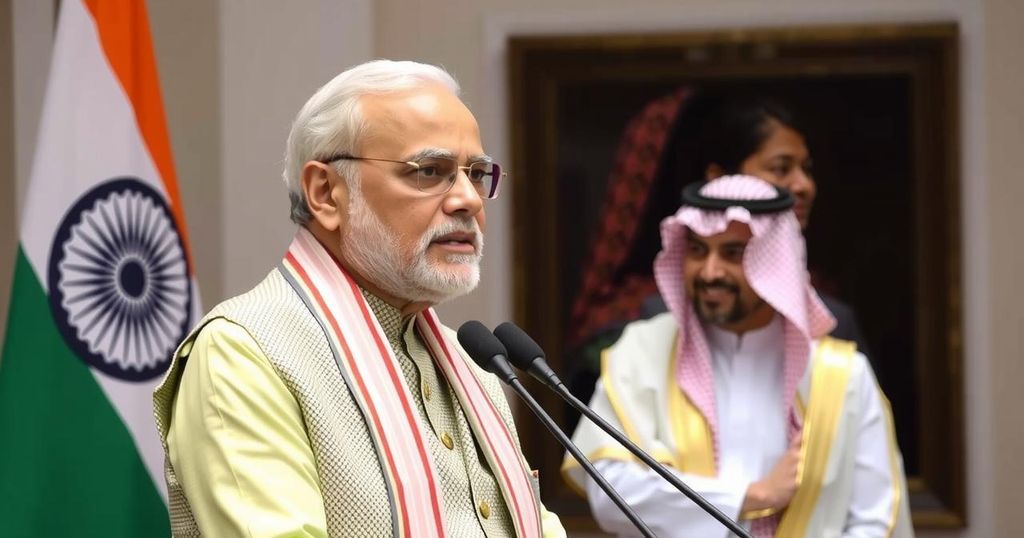Prime Minister Modi’s Vision for Indian Diaspora in Kuwait
Prime Minister Narendra Modi addressed the Indian diaspora in Kuwait, urging participation in India’s development by 2047. He highlighted the historic ties between India and Kuwait, emphasized the contributions of Indian professionals, and announced India’s vision as a skilled labor hub. Modi also visited a labor camp to show support for Indian workers following a recent tragedy, reinforcing India’s commitment to its citizens abroad.
Prime Minister Narendra Modi addressed the Indian diaspora in Kuwait during the “Hala Modi” event held at the Sheikh Saad Al-Abdullah Indoor Sports Complex. He encouraged the Indian community to participate in the transformation of India into a developed nation by 2047. Highlighting the historic ties between India and Kuwait, Modi noted that he is the first Indian prime minister to visit Kuwait in over four decades, underscoring the significance of this partnership.
During his address, Modi commended the contributions of the Indian community in Kuwait, which comprises over one million individuals, particularly praising the skills of Indian teachers in educating Kuwaiti youth and professionals in constructing advanced infrastructure. He emphasized that India is evolving as a “Vishwa Bandhu” (friend of the world), positioned to fulfill global demands for skilled labor and innovation, especially through signed migration agreements with various countries.
Modi remarked on India’s advancements in technology, infrastructure, and sustainability, citing the nation’s status as the fifth largest economy and a leader in fintech and digital connectivity. He pointed out the mutual objectives between India’s vision of “Viksit Bharat” (Developed India) and Kuwait’s “New Kuwait” initiative, suggesting substantial opportunities for collaboration.
The Prime Minister also visited a labor camp in Mina Abdullah, which accommodates around 1,500 Indian workers, to show empathy and concern for their welfare. This visit occurred after a tragic incident in June that resulted in the loss of 46 Indian lives in a housing complex fire, reiterating the importance India places on its citizens abroad. In an extension of his cultural outreach, he interacted with Abdullah Al-Baroun and Abdul Lateef Al-Nesef, who have translated works of Indian epics into Arabic, showcasing the global appeal of Indian culture. Modi also engaged with Mangal Sain Handa, a 101-year-old former Indian diplomat whom he praised for his contributions to India’s development.
The Indian diaspora in Kuwait plays a significant role in the local economy, with a strong presence comprising mainly skilled workers and professionals. This relationship between India and Kuwait has historical roots, given that a large number of Indians have resided in Kuwait for decades. Prime Minister Modi’s visit to Kuwait represents a diplomatic effort to reinforce ties between the two nations and to acknowledge the contributions of Indian nationals abroad, particularly in terms of labor and cultural exchange. Modi’s emphasis on skilled labor and innovation aligns with international trends of migration for work, as many countries, including those in Europe, seek to attract Indian professionals.
In conclusion, Prime Minister Narendra Modi’s address to the Indian community in Kuwait highlighted the crucial role of the diaspora in India’s ambitions for development by 2047. By fostering partnerships and acknowledging the contributions of Indian professionals overseas, Modi aims to strengthen India’s international relations and enhance the welfare of its citizens abroad. The visit underscores India’s commitment to cultivating its global presence, particularly in areas of technology and skilled labor.
Original Source: www.hindustantimes.com




Post Comment